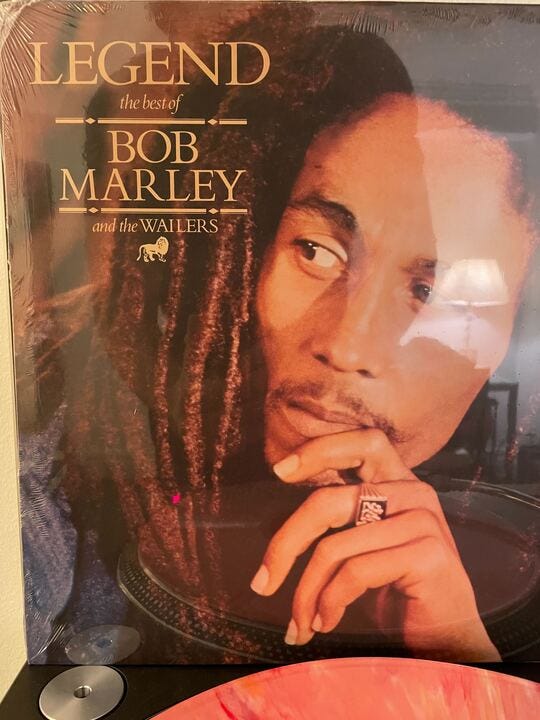Sam Valenti (SV4) is an old friend of WITI. He’s the founder of Ghostly International and runs the essential music Substack Herb Sundays.
Sam here. A few years ago, Patrick Adams, a music producer I love, passed. While he received a kind obit from the Times and various music sites, his work requires a bit of effort to access. Your first instinct would be to look at his top songs on whatever DSP (digital service provider) you use, say Apple Music or Spotify, but this will only help a little as he's a producer, not the title artist. Even more prominent artists' “top songs” often throw up some surprises and can differ significantly across music services. Take, for instance, the top 6 most popular songs for an act like De La Soul, the lion’s share of whose music was just added to DSPs in the last year. After an obvious TikTok hit, only two other songs overlap across the biggest digital services. This incongruity is a problem for new fans seeking to learn more about a given artist.
Why is this interesting?
I've been thinking about the death of the pop culture canon as we know it and wrote about it last year. Since then there have been continued threats on the establishment and maintenance of respected canon in the music industry, even as recent as this week. Few formats, for example, have been more canon-defining for musical artists than their Greatest Hits package. These records have never been considered cool, especially for “album artists” (think Steely Dan), but they have been wildly successful historically. In an on-demand era, the need for these packages understandably has disappeared and streaming has replaced this concept with branded algorithmic playlists such as Spotify’s This Is… series and Apple Music’s Essentials, which handily pull together fan faves and top streaming songs in one place.
If, in the streaming age, we've seen the venerable Best Of and Greatest Hits compilation fall away, is there still use in the canon-defining package? DSPs might say yes. “Where we see the most engagement with fans around Essentials is with artists that are extremely popular and don't have a compilation of studio hits," a representative for Apple Music told NPR about their curation efforts in 2019. "For example, Essentials playlists for artists like Bad Bunny, Post Malone, Drake, Ed Sheeran, Billie Eilish, Cardi B, Ariana, Khalid, Luke Bryan, and Shawn Mendes are frequently in our top 20."
These generative playlists are helpful primer guides but lack something vital for canon formation: a curator’s touch. Consider the most controversial GH of all time: Legend: The Best of Bob Marley and The Wailers. The making of Legend was a highly choreographed event seeking to market Marley posthumously as a stoner love prophet while sanding down his revolutionary edges for generations of college kids. Even the photo was chosen to be approachable and meditative, not too political or threatening. It was a canny business move but you wish Marley had been alive and at the table for these choices.
In the 2022 memoir The Islander by Island Records founder Chris Blackwell, he breaks down the origin story of Legend as the vision of then recently hired Dave Robinson (co-founder of legendary label Stiff Records), which sent the posthumous Marley brand into a supernova.
“Dave also shrewdly and actively chased a wider audience for Bob Marley, even though we thought we had already reached a wider audience. He wanted to get to an audience that maybe bought only one or two albums a year, who weren’t interested in fashion or the latest hip sound. ...He wasn’t emotionally as close to Bob as we were at Island, and he started to do some market research both with white suburban record buyers and the faithful followers, just to make sure he didn’t go too far. The market research group asked three different age cohorts for their thoughts.”
Legend has since sold over 12 million copies worldwide, not including the millions of other cassette and CD bootlegs that abound.
A renewed GH campaign, with video or written liner notes from one of the many talented music journalists in the game righ now, could also help chip away at a mountain of resurgent music and add another path to discovery akin to sync licensing (Kate Bush finding an audience through a Netflix show) alongside TikTok randomness that can help reshape a canon and add lost cuts that deserved to be Greatest Hits material all along. For instance, see Pavement’s top song on DSPs, “Harness Your Hopes,” which shot from an album leftover to an EP cut to a bonus track and then becoming Pavement's most streamed song semi-randomly on Spotify in 2017 (currently at 121 million streams there).
I’m now of the mind that all artists should be making these Best Ofs, even if just as an edited playlist, ideally made by the artist or group themselves. As much as I know that I can go to the DSPs for this purpose, I like the idea of the artist choosing the songs and the flow of these cuts to help guide me through their catalog. Given my love for the trusty Greatest Hits, I was pleased when I saw the band Spoon releasing one in 2019. As Wikipedia tells it:
The album was conceived and compiled by Spoon lead singer Britt Daniel, who chose the track list to introduce the band for new listeners… Although greatest hits compilations were uncommon by the late 2010s, Daniel chose to create 'Everything Hits at Once’ based on his fondness for such compilations, in particular ‘Standing on a Beach’ by The Cure and ‘Substance 1987’ by New Order, which had introduced him to those artists in his youth.
Artists can control their image and story more than we may realize and maybe better enabled to do while active and engaged with their audience. (SV)
—
Thanks for reading,
Noah (NRB) & Colin (CJN) & Sam (SV4)
—
Why is this interesting? is a daily email from Noah Brier & Colin Nagy (and friends!) about interesting things. If you’ve enjoyed this edition, please consider forwarding it to a friend. If you’re reading it for the first time, consider subscribing.






This is really insightful and has me reconsidering my knee-jerk reaction to greatest hits comps as a cash grab or a placeholder. as a young SY obsessive, the Screaming Fields comp helped me navigate their very complex early discography. the Patrick Adams example is perfect. when he passed, I told everyone i knew to listen to the Inner Life LP, which wouldn’t show up under any DSP algo for him, but is an incredible example of his depth and range. i’ve always appreciated the Strut comps that go in on the nitty gritty of producer credits, and the Test Pressing producers playlists are essential!
Very interesting - curation is undervalued and I miss that idea of having greatest hits.